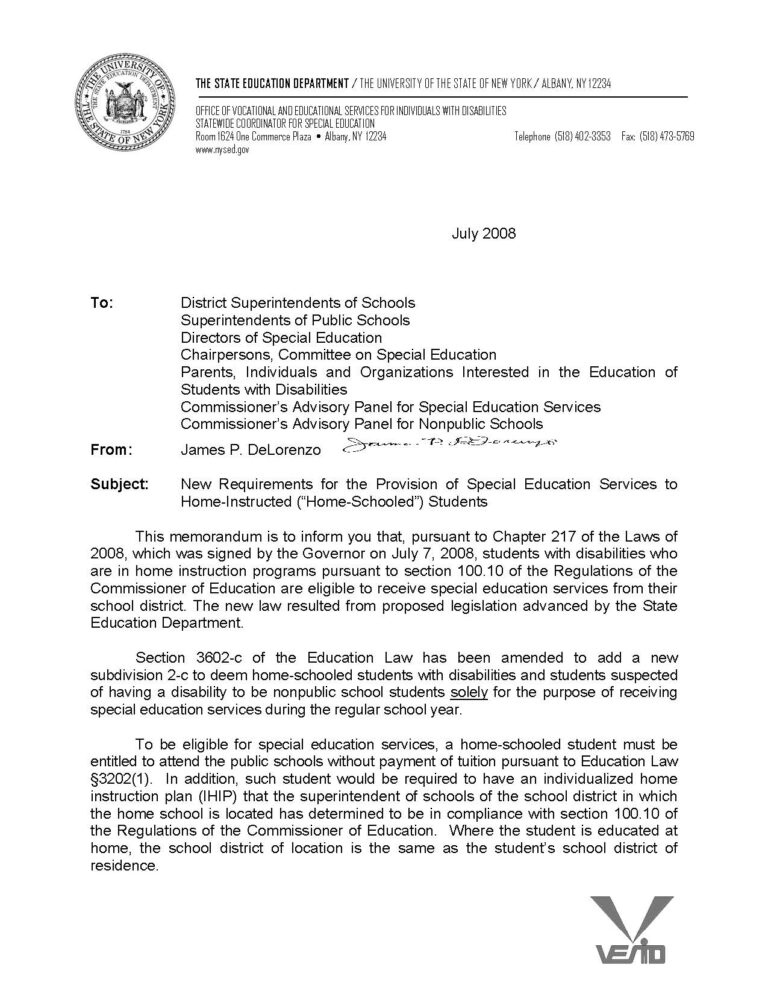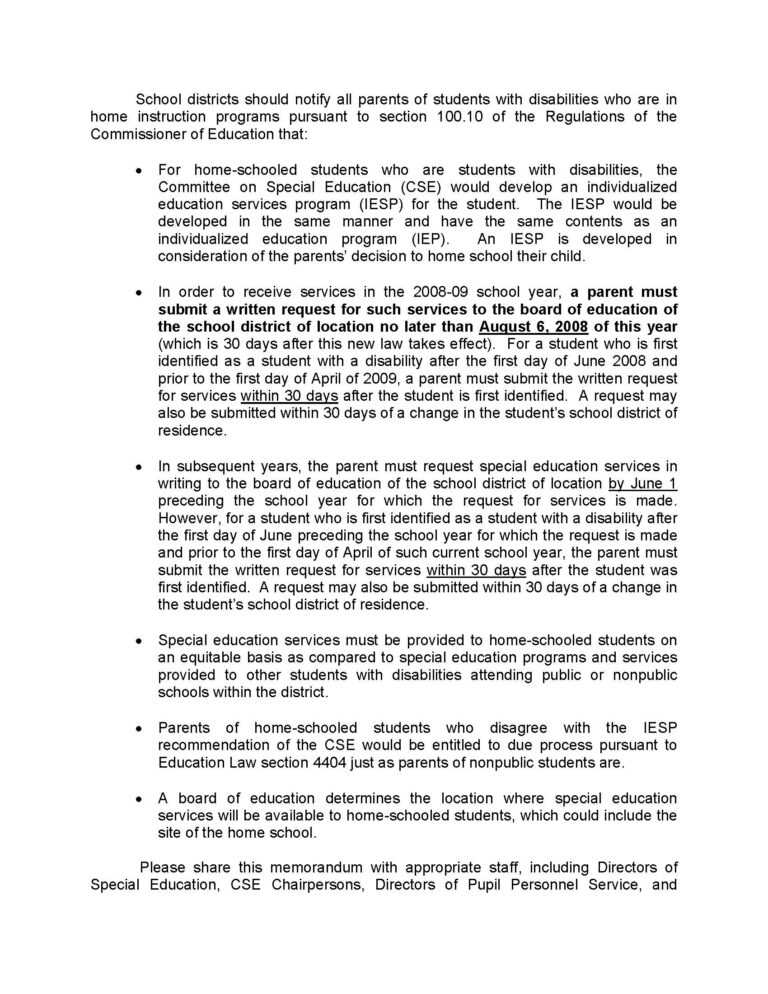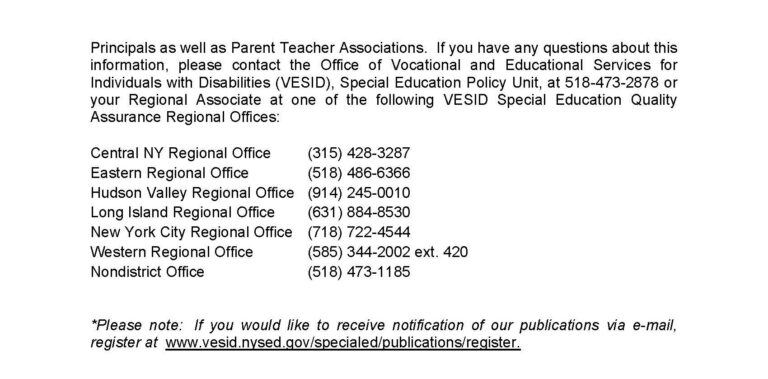In this post I attempt to gather the relevant law regarding special education for the home-schooled. Many in New York State choose to “home-school” their children to avoid the mandate to inoculate. Since the removal of the “religious exemption” in 2019 and the heightened standard of “contraindication” or actual harm required for a medical exemption, the prerogatives of the home-schooled family have become limited by the actions of local school boards. Ironically these same District school boards are often cited by parents for support of their decisions to home-school in the first place.
It is true, compulsory school age children have the legal right to receive instruction at home pursuant to 8 NYCRR section 100.10. Since 2008 New York State has authorized the provision of special education services to home schooled children. In July of 2008 the New York State Education Department issued a memo that introduced this law.



A few years after the memo, the issue was tested in a New York State Supreme Court case. There, Honorable George Ceresia Jr. confirmed the validity of the New York State opt in for home-schoolers. [1]
Under Education Law § 3602-c(2-c), disabled students in a home instruction program are deemed to be nonpublic school students for the purpose of receiving special education services. Moreover, federal law requires school districts to provide “[s]ervices to parentally-placed private school children with disabilities,” including transportation to and from the child’s home to the site of special education services (34 CFR 300.139[b][l][i]). . . . [S]pecial education is defined as “specially designed individualized or group instruction or special services or programs . . . at no cost to the parent, to meet the unique needs of students with disabilities” [2]
It has long been the case that special education includes specially designed instruction conducted in the home. [3] When home education is a preference rather than an educational necessity, the extent of special education rights under the Individuals with Disabilities Act (“IDEA”) and Section 504 for this group of students is determined solely as a matter of state law. Since 2008 children with disabilities in New York state home-schools must be treated in the same way as other parentally placed private school children with disabilities for purposes of IDEA.
The IDEA requires not only an appropriate Individualized Education Program (“IEP”), but implementation of the “placement in a school that can fulfill the requirements set forth in the IEP.” [4] The concern is, the only guidance readily available regarding the implementation of special education services for home-schoolers is found in the above cited memo from New York State Education Department in 2008. The pertinent part regarding the location of services follows:
“A board of education determines the location where special education services will be available to home-schooled students, which could include the site of the home school.” [5]
The good news for home-schooled families is that “School districts do not have “carte blanche” to assign a child to a school “that cannot satisfy the IEP’s requirements,” [6]
Other caselaw lays out additional foundational requirements . . . “While it is speculative to conclude that a school with the capacity to implement a given student’s IEP will simply fail to adhere to that plan’s mandates,” a challenge is appropriate where the school is “factually incapable” of implementing the IEP. [7]
So, what is the issue? Is this a new spin on the oft discussed “bricks and mortar” provision of special education services? It has been asserted that a District could avoid their responsibility to homeschoolers simply by having the appropriate services delivered at the community school, where parents would be required to submit to immunizations under the Public Health Law. According to a Q&A listed on the New York State Education Department’s website, parents are not required to show proof of immunization for homeschooled students. However, to gain access to a public or nonpublic school, proof must be provided. See below for the discussion:
Q: 15. Must students instructed at home meet immunization requirements for in-school students?
A: 15. The provisions of Public Health Law Section 2164 which require parents to submit proof of immunization prior to admission of their children to a school do not apply to students being educated at home. If the Commissioner of Health notifies school officials of the outbreak of a disease for which immunization is required, however, parents of children on home instruction who seek to participate in testing or other activities on the premises of a public or nonpublic school must produce proof of immunization or the children must be denied access to the school building.
I believe the resolution of this issue requires a fully developed factual record and a decision by a an Impartial Hearing Officer, a State Review Officer and or a Judge at the District Court level. Give us a call with your thoughts or ideas concerning this post.
_____________________________________________________________
[1] See Andes Central School District V. John King, et al. NYS Supreme Court, Albany County Index #7053-11 RJI # 01-11-ST3144.
[2] See 8 NYCRR § 200.1 [ww] [emphasis supplied].
[3] See 34 CFR 300.39 (a)(1)(i).
[4] See D.C. v. N.Y.C. Dep’t of Educ. , 950 F.Supp.2d 494, 88509 (S.D.N.Y. 2013)
[5] See page 2 of the 2008 Education Department memo, supra.
[6] See T.Y. v. N.Y.C. Dep’t of Educ., 584 F.3d 412, 420 (2d Cir.2009)
[7] See J.D. , 2015 WL 7288647, at *16 (quoting K.C. ex rel. C.R. v. N.Y.C. Dep’t of Educ. , No. 14–cv–836 (RJS), 2015 WL 1808602, at *12 (S.D.N.Y. Apr. 9, 2015) ).
_____________________________________________________________
Statutory Background
From Goe v. Zucker et. al., U.S. Court of Appeals, Second Circuit #21-0537-cv, July 29, 2022 (for internal citations and footnotes please see published decision)
For more than a century, the State has required mandatory immunization for children to attend school. See Act of Apr. 16, 1860, ch. 438, 1860 N.Y. Laws 761, 761-62. Today, all children between the ages of two months and eighteen years must be immunized against a number of diseases to be admitted to school or to attend school for more than fourteen days. See N.Y. Pub. Health Law § 2164(7)(a).
These diseases include “poliomyelitis, mumps, measles, diphtheria, rubella, varicella, hepatitis B, pertussis, tetanus, and, where applicable, Haemophilus influenzae type b (Hib), meningococcal disease, and pneumococcal disease.” The fourteen-day period can be extended for students transferring from out-of-state if they show that they are seeking in good faith the required certification or other proof.
The State has also permitted exemptions from school immunization requirements for many decades. See, e.g., Act of Apr. 20, 1953, ch. 879, 1953 N.Y. Laws 2141, 2289-90 (providing deferment from school immunization for smallpox based on “medical reasons”) (repealed 1968). Until the 2019 amendments, Section 2164 provided two statutory exemptions from its school immunization requirements. See Act of Aug. 3, 1966, ch. 994, 1966 N.Y. Laws 3331, 3333.
Under the non-medical exemption, a child was not required to be immunized if that child had a parent or guardian who held “genuine and sincere religious beliefs” against immunization. N.Y. Pub. Health Law §2164(9) (repealed 2019). That changed when the United States — with the State as an epicenter — experienced a nationwide measles outbreak between 2018 and 2019. With outbreaks in the State largely concentrated in communities with low immunization rates, the State legislature repealed the availability of the non-medical exemption in June 2019. See Act of June 13, 2019, ch. 35, 2019 N.Y. Laws 153, 153-54; App’x at 108 (explaining that “[a]fter California repealed their non-medical exemptions, their vaccination rates improved demonstrably, particularly in schools with the lowest rates of compliance”).
Like some other states, the State now only allows medical exemptions from school immunization. Under the State’s present requirements, a child may be exempted from school immunization if “any” state-licensed physician “certifies that such immunization may be detrimental to [the] child’s health.” N.Y. Pub. Health Law § 2164(8). The request must “contain[] sufficient information to identify a medical contraindication to a specific immunization.” N.Y. Comp. Codes R. & Regs. tit. 10, § 66-1.3(c). School officials enforce these requirements, see N.Y. Pub. Health Law § 2164(7)(a), and may require additional supporting information before granting requests for exemptions, see N.Y. Comp. Codes R. & Regs. tit. 10, § 66-1.3(c). The denial of a medical exemption is appealable to the Commissioner of Education. N.Y. Pub. Health Law § 2164(7)(b).
On August 16, 2019, Commissioner Zucker issued emergency regulations to implement the State’s legislative repeal of the non-medical exemption (the “new regulations”). In doing so, the Commissioner explained that these new rules would ensure that the State’s immunization requirements conformed to “national immunization recommendations and guidelines.” App’x at 138. The new regulations were adopted on December 31, 2019. They require the use of a medical exemption form approved by the Health Department or the New York City Department of Education, completed and signed by a physician, certifying that “immunization may be detrimental to the child’s health.” N.Y. Comp. Codes R. & Regs. tit. 10, § 66-1.3(c). A completed form must provide “sufficient information to identify a medical contraindication to a specific immunization and specify[] the length of time the immunization is medically contraindicated.” The new regulations also define the phrase “[m]ay be detrimental to a child’s health,” as used in section 2164(8) of the New York Public Health Law, to mean “that a physician has determined that a child has a medical contraindication or precaution to a specific immunization consistent with ACIP guidance or other nationally recognized evidence-based standard of care.” § 66-1.1(l).
The ACIP Guidelines define a “contraindication” as a “condition[] in a recipient that increases the risk for a serious adverse reaction,” App’x at 489, and recommend that a vaccine not be administered when such a contraindication exists. Examples of contraindications include being severely immunocompromised, having an immunodeficiency disease, or suffering a severe allergic reaction after a previous vaccine dose. The ACIP Guidelines separately define a “precaution” as a “condition in a recipient that might increase the risk for a serious adverse reaction, might cause diagnostic confusion, or might compromise the ability of the vaccine to produce immunity.” For precautions, the ACIP Guidelines recommend deferring, in lieu of completely foregoing, vaccination. Examples of precautions include experiencing moderate or severe acute illness or a personal or family history of seizures.

